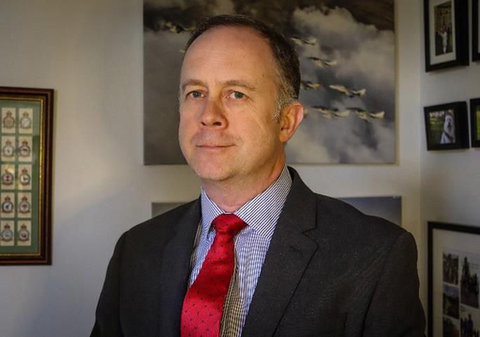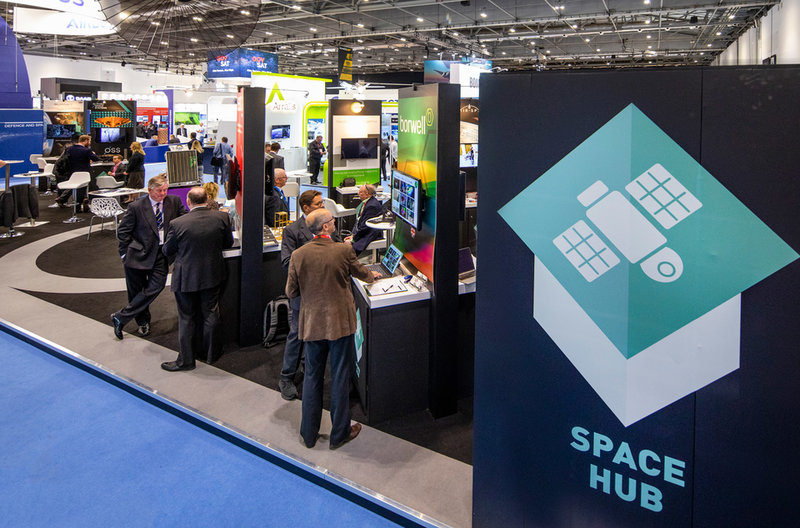What to watch out for at DSEI 2021: Gary Waterfall Q&A
DSEI 2021 opens its shutters on 14 September. After 18 months of Covid restrictions, it will be one of the largest defence industry trade shows taking place this year, and it will inarguably be unlike any other. Berenice Healey talks to DSEI senior defence advisor Air Vice Marshal (ret.) Gary Waterfall about what to expect.
Defence and Security Equipment International, known to its friends as DSEI, is the largest biennial defence industry event in the UK. It was touch-and-go whether it would take place as an in-person event at all until a couple of months ago. But with a great deal of work from the team to make it a safe and enjoyable way to get an update on defence technology and do business, it is ready to emerge with all guns blazing.
This year’s event will be dominated by the theme of multidomain integration and will have a strong focus on the relatively new themes of data, space and sustainability, all of which featured in the Ministry of Defence’s (MOD) Integrated Review.
We ask DSEI senior defence advisor Gary Waterfall what to expect from the event.

// Air Vice-Marshal (ret.) Gary Waterfall is the senior defence advisor to DSEI
Berenice Healey:
What have you and the DSEI team been doing to prepare for the event over the last year or so?
Gary Waterfall:
I and the team have been concentrating on the MOD engagement, ensuring that we've got a truly symbiotic relationship with the MOD, but also with international trade, because the show is so important for Great Britain’s prosperity. Post-Brexit and post-Integrated Review, it's really important that we're singing in unison.
We've also been doing some work on the DSEI Connect online tool. It says we acknowledge that we need to make sure we optimise the time you're on-site; Covid helped us down that path. It’s a platform to enable people to meet, real and virtually, and build meetings and share some of their thoughts and knowledge of what we have done.
It's also going to be good for those that can't possibly be there in person. You'll be able to watch some of the key speakers and keynotes. We've got Julianne Gallina, who is the CIO of the CIA, and acting head of acquisition for the US DoD, Gregory Kausner, coming over.
We're not going to deliver 100% of the show we'd hoped in 2020 – that's just impossible because of the current Covid restrictions. We've retained 70% of the bookings, which I think is really quite remarkable. All the primes that you'd expect to see that will be there, as well as a host of new blood.
Why is 2021 the year DSEI is focusing on multidomain integration for the first time?
We've seen defence go on a journey from a single-service stovepipe operation, maybe giving one service priority of command – the Falklands War is a good example of that – into the need to do joint operations, and then the birth of the permanent joint quarters.
Since 2010, we've had forced upon us this business of information advantage and information warfare. We've traditionally thought about a kinetic operation; we are probably in a level of conflict with a lot of people around the world today, but it's all done in what's termed the grey zone. Developments around that and the relatively new domains of space and cyber are going to help accelerate that.
The Integrated Review realised this, with a real emphasis on the importance of inter-force collaboration and cohesion, which gives you an uplift in your ability to prosecute campaigns with effectiveness and we're seeing the great effect of that right now.
Multidomain integration is going to galvanise UK forces that are new and better by design because they just deliver seamlessly, at the point of need, supported and enabled by a digital backbone. Strategic Command's now looking at the digital boundary, to try and galvanise multidomain.
The MOD's got that we deliver this in terms of the integrated response to future threats, but how does that then manifest itself? You can't just have the single services offering stovepipes, they've all got to come together. Some of the top leaders only discuss long-term visions, but General Sir Patrick Sanders will be rolling out Strategic Command’s strategy at the show, so that speaks volumes as to how that's going to work.

// Space technology and satellite communication is an area to watch at DSEI 2021. Credit: DSEI
How will DSEI support defence and industry to make multidomain happen?
DSEI is an essential stepping stone, never more so since the MOD published the Integrated Review and the Defence and Security Industrial Strategy (DSIS). We’re coming out of the pandemic; we came out of Brexit and we're going to be able to socialise face to face. By working collaboratively online we've learned a lot from the pandemic, but there’s no substitute for face-to-face meetings.
DSEI is going to provide that forum on the theme of integrated response to future threats, and it's going to spotlight the whole of the UK forces and industrial leaders, looking at how is the landscape changing to the threat landscape. What are these future operational requirements, particularly when you're looking at that information superiority/supremacy in a given environment which we want to achieve?
Every single zone is going to have that theme in its keynotes, and we've worked very closely with the MOD to ensure that there's a thread of continuity through the event. It’s taken a lot of work from the planning team to knit together with the working groups and the steering groups.
We're providing the stage for industry and defence to say where the requirements are and where they're going. And what about the supply chain? I've often been quoted as saying it's SMEs that have the key. How do we give them oxygen? It is going to be by bringing everyone together at DSEI and providing a defence and security stage for people to talk, question and learn from.
What are your top things to look out for at DSEI?
After the event, we’ll talk about the big announcements, but there are three areas where you're going to turn around and go: “They were bigger than I thought.”
The first is data and cyber in the Future Tech Zone, looking at that digital backbone boundary integration because the world now is so reliant on data.
The next one is space technology and satellite communications because we're going to be launching satellites from the UK next year. We've now got reusable space vehicles that we can turn around in an hour and space launch vehicles dropping off 747s and launching satellites into space. The commute into space is now becoming affordable.
The last thing is sustainability. I had an “in conversation” with General Sir Richard Nugee which was one of the most remarkable ones I've done from an education perspective. I was always worried that to get something that is environmentally friendly and sustainable you're going to compromise on operational capability and output. Richard Nugee would say that we've crossed that cost-benefit line.
Outside of DSEI, you'll see some electric quad bikes and hybrid vehicles. The pandemic has helped us to recognise the damage that we've done to our planet. We've seen the red warning signs; defence doesn't have a choice now.
Women in Defence is a DSEI partner this year. How is DSEI incorporating diversity and inclusion?
My service is very proud that we had the first female three star commander, Air Marshal Sue Gray, and now we've got a clutch of two stars in the Air Force; Suraya Marshall has just been promoted to Air Vice-Marshal to run 11 group.
When you look at industry, Anna Keeling who runs Boeing Defence UK is a great example of a woman who's doing an incredibly great job. It's hard on the military side; over time we won't have to talk about it, but it's really important to [do so] now.
We’ve been working with Women In Defence founder Angela Owen since the last DSEI to make sure all the panels are as gender diverse as they possibly can. What we're not going to be doing is just putting people in there because we want to achieve that gender balance. We're seeking out the right experts and making sure wherever we can we've got really good gender balance.
Angela Owens has an interview with Chief of Defence Staff General Sir Nick Carter to talk about 10 years of Women in Defence UK, what it means to him, and how far we've come. We've got a seminar on Women in Defence 30 by 30, which is trying to get 30% women by 2030.
How are you keeping the event Covid safe for everyone?
First and foremost, we're sticking with what the government and local council require in terms of any restrictions. We’ll incorporate any guidance from public health bodies because we aim to have a safe, secure, and successful show, and we want everybody to feel as comfortable as they can.
We’ve moved all the keynote addresses away from the big theatres where everyone would sit together and put them into a media centre to give the keynote speakers that safe and secure environment. We're going to have limited slots for journalists to come in and ask questions. Everyone else out on the floor will be able to watch it live with a slight time delay for security.
We’re going to ask people to show proof of vaccination or a negative test. We’ll ask people to voluntarily wear a green or a red wristband. If you come towards me and I'm wearing a red wristband, please just keep your distance. Wearing a green wristband, I’m up for social interaction.
We've done the maths about the size of the Excel centre and the number of exhibitors and delegates we've got coming, and we've got something like capacity for 10,000 people while allowing a two-metre exclusion around people. We're in a good place, but we'll do everything we need to do to give people a safe and secure experience.
Is there anything else you’d like to share with GDT readers?
Your readers might think that it's just going to be the UK, because of the pandemic travel restrictions. But we’re now up to 20 country pavilions; Portugal is coming for the first time, and we've got Estonia, Greece and Belgium, who have expanded their pavilions significantly.
Day one, we've got Lieutenant General Erik C Peterson, the US Army Deputy Chief of Staff, coming along, and we have new outdoor vehicle demos.
All these things really show that the UK is open for business, and global industry from the defence and security sector is back on the stage and wanting to help the world become a better and safer place together.
// Main image: The main theme for DSEI 2021 is multidomain integration. Credit: DSEI
Events